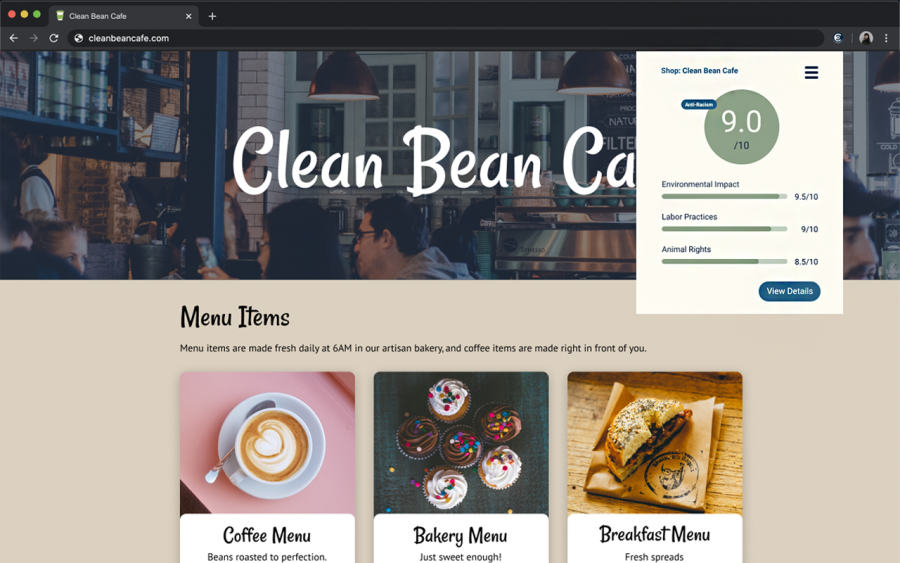Sac State student’s free browser extension makes ethical shopping easier
Ethicli scores shops on environmental impact, labor practices
An example of what an Ethicli score looks like on a browser. The extension provides scores on four categories: environmental impact, labor practices, animal welfare and social involvement. Photo courtesy of Billy T. Hernandez.
December 15, 2020
Earlier this year, Billy T. Hernandez, a junior computer science major at Sacramento State, was online shopping, frustrated with the lack of ethical options. Hernandez wished he had something to tell him what better options there are, so he tried a few browser extensions with information about online shops’ company ethics. Underwhelmed by his options, which all felt like ads to him, Hernandez knew what he had to do next: develop an ethical browser extension of his own.
Hernandez and three others created Ethicli, an online browser extension that informs consumers about company ethics and offers alternative products. Ethicli provides a 0-10 rating scale for over 7,000 stores online, while offering alternatives for over a hundred items.
Ethicli breaks the scoring down into four categories: environmental impact, labor practices, animal welfare and social involvement. If Ethicli doesn’t have a report for a site you’re looking for, the browser says you can request a report and it will have one up for you within 24 hours.
Ethicli was founded in May of this year and just celebrated its 100th user, Hernandez said. The creators of the online browser said they hope customers will take advantage of Ethicli’s information this holiday season, giving potential shoppers more knowledge on the stores that they’re shopping from.
Recently Ethicli won a $250 pitch competition from the engineering and computer science department at Sac State for Global Entrepreneurship Week.
“It saves me time and allows me to shop more consciously,” Ethicli user Selenne Martinez, 22, said via email. “Ethicli has allowed me to feel more proud of myself in terms of the decisions I am making, the power of the pocket is real.”
Hernandez said Ethicli’s main purpose is to give its users clarity on the products they are buying.
“You know when you’re shopping online and you can see an image of a product, and you can see its price, but you can’t see anything about its environmental impact or who the people were that were making it, or anything like that,” Hernandez said. “Ethicli is something that you add that helps show you that kind of information, so that you can know that what you’re buying is good for the environment and good for people.”
“I’d really like to see for this to be a common thing to use and push companies to be more ethical,” Hernandez said.
Hernandez also said he hopes that a push for more ethical products by customers will lead companies to realize that consumers prefer products made with good ethics and then make an effort to have more ethical items and transparency with the public.
Ethicli co-founder Amy Tims, who is in charge of assessing the scores for the companies, explained that she reads over public data sets looking for information about certain companies, and will update with new information as it comes out. Tims, who met Hernandez at a UC Davis event a year prior, agreed to work on Ethicli after she got a message from Hernandez explaining the idea for the browser extension and offering her a position.
“I have spent so much of my adulthood dealing with shop overload,” Tims said. “It saves time and energy. Purchases reflect my values.”
While Ethicli profits through commissions, they give their ratings and their extensive research to the public for free, Hernandez said. Hernandez and Tims said the biggest hurdle for Ethicli currently is gaining users and beta testers to inform them on what could be improved along with other feedback.
Ethicli is free to download for Chrome and Firefox and is still looking for beta testers.































































































































